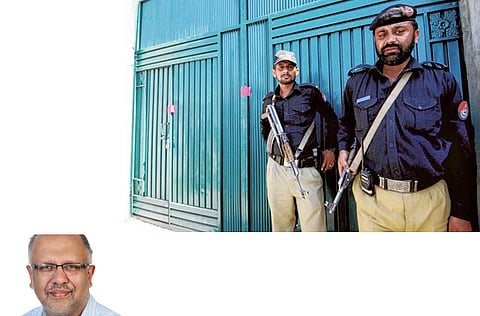Pakistan's intelligence failure
Farhan Bokhari writes: An independent probe should examine the army's preparedness to meet unexpected threats

A week after a sudden US commando raid in Pakistan's northern city of Abbottabad finally ended the long and bloody reign of Osama Bin Laden, the country continues to face many unanswered questions directly tied to the conduct of its civil and military leaders in the wake of this crisis.
It is abundantly clear that the US chose not to inform anyone in Pakistan ahead of the attack, ostensibly over concerns that such advance information may have alerted Bin Laden ahead of the attack and possibly prompted his escape. Such a suggestion smacks Pakistan's so-called professional security apparatus right in the face.
While the issue of trust or lack of it surrounding US-Pakistan ties is hugely significant, that issue alone is not the only challenge faced by key decision makers towards their responsibilities, following this brazen incursion by a foreign military power in Pakistan's air space and land.
To begin with, this incident marks a major intelligence failure on Pakistan's part in general and notably on the part of the country's Inter-Services Intelligence counter espionage agency in particular. The ISI for long has been widely seen as the key outfit meant to gauge a variety of threats to Pakistan's interests.
But historically, following successive military interventions in running the country's affairs, the army-run ISI has also been sucked into the political mainstream. While the agency has no formal role in politics, its past is littered with instances of dabbling in Pakistan's political process.
One of the consequences of the ISI getting dragged into the political mainstream has indeed been that its professional credentials as a security agency have suffered badly. Rather than pure counter-intelligence work, the ISI has acquired a reputation of dabbling in matters outside its mainstream work.
The US attack on Abbottabad came without any prior warning which alone should be sufficient to take the ISI to task.
More notably, Pakistan's security services now appear to have been caught napping in mobilising themselves to block the incoming US troops. Indeed, it now seems that a coherent response began coming together only after the US forces had already left the country.
To credibly investigate claims of an intelligence failure on Pakistan's part, it is essential that an independent inquiry, ideally by a panel of judges or members of parliament be instituted.
Given that the ISI is run by Pakistan's influential army, and its successive heads including its present Director General, Lieutenant General Ahmad Shuja Pasha, have been serving army officers, an inquiry must also examine the state of the Pakistan army's preparedness to meet unexpected threats. This is critical for two fundamentally vital reasons.
Filling the gaps
First, across Pakistan there is ample evidence of large scale public demoralisation following the US attack in Abbottabad. A demoralised nation in conditions of the kind prevailing in Pakistan today can easily lose confidence in the ability of its armed forces to put up requisite defence in future.
It is therefore vital that a parliamentary inquiry takes place on the state of affairs within the armed forces which is Pakistan's most well-funded institution. The armed forces themselves should step up to encourage such a process as part of an exercise to improve the public's confidence in their ability to defend the country. Any gaps which undermine the ability of the armed forces to defend Pakistan need to be filled immediately.
But the second element in this strategy is all the more vital. It has to do with the presence of hardline militants across Pakistan including those belonging to groups with a reputation of being patronised by the state in the past.
This is all the more essential as Pakistan is likely to come increasingly under the global spotlight for providing space to hardcore militants, following the killing of Osama Bin Laden and subsequent allegations of his presence in Pakistan with the knowledge of at least some of his local facilitators.
Tragically in the past, Pakistan's rulers, civil and military, have often shown a tendency of failing to assess the challenges faced by the country in good time. It is not surprising that Pakistan today is struggling to deal with a widespread economic malaise, while its politics is dominated in large part by self-serving individuals.
On the streets of Pakistan, it's not surprising that the level of popular desperation runs high. The US attack to target Bin Laden could indeed mark a long awaited wake-up call for a country teetering on the brink of a major crisis, if only institutions responsible for security are finally made to account for the gaps surrounding their preparedness, following an unexpected breach of national security.
Farhan Bokhari is a Pakistan-based commentator who writes on political and economic matters.
Sign up for the Daily Briefing
Get the latest news and updates straight to your inbox


